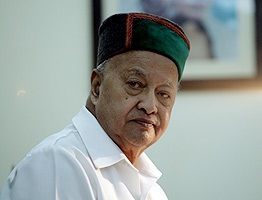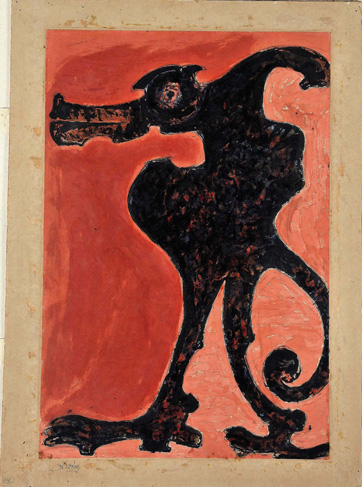Raja Sahib – Virbhadra Singh – is no more. His demise leaves a gaping void not only in Himachal politics, but also in the hearts of many who had worked with him in any capacity. He was an able administrator, an admirable guide and mentor, and a kind and supportive boss. His smiling visage and gentle demeanor endeared him to one and all. Of course, he did display dismay and anger at times, but his overall appearance was that of a calm and thoughtful individual.

My association with him began in 1985, when I was handpicked by him to serve as Divisional Forest Officer (DFO) at his royal seat, Rampur Bushahr. My return from deputation with the Govt. of India, in 1983, coincided with his return to Himachal Pradesh from the Centre. While he took over as Chief Minister of the State, I was posted as DFO Working Plans at Shimla. In 1985, when I was looking forward to my promotion as Conservator of Forests (CF), I suddenly received orders posting me as DFO Rampur Forest Division. When I asked the Secretary (Forests) about this unexpected development, I was told that the CM had personally asked for me. It seems he had called for the personal records of eligible officers, and then handpicked me for the post. The HP Forest Department, in those days, was in the center of a massive timber smuggling scandal and the CM wanted an officer who was yet untouched by the scandal to be posted at his home town. How could I refuse? I proceeded to Rampur and took charge.
A few days later I learnt that the CM was coming on tour to Rampur, which, I later learnt, was a regular visit once every couple of months. I went to Narkanda along with other officers to receive him at the edge of my jurisdiction. As his car came to a stop in the porch of the Circuit house, I stepped forward and, before his security guard could do so, I opened the door of the car and extended my hand saying, “Sir I am the new DFO of Rampur.” Everybody present was flabbergasted when he looked me up and down and took my hand in return and said, “Welcome.” The Deputy Commissioner, who was accompanying him, gave me a disapproving glare, but the CM put his hand on my shoulder as he walked towards the sitting room. No words were exchanged, but my heart swelled with pride at the signal honour accorded to me by the head of the State! Later I was told, in no uncertain terms, by the DC that this was simply not done. Nobody, but nobody, shook hands with the CM. The done thing was to respectfully fold one’s hands in a Namaste, that too from a respectable distance. But what was done was done, and nothing could undo it. I had made my mark, and my fellow officers at Rampur were suitably awed.
Whenever Raja Virbhadra Singh visited Rampur, supplicants would line up in the corridors of Padam Palace, with handwritten supplications in their hands, which they would humbly hand over to the CM, who accepted all of them and handed the same to the DC for further action. Interestingly, any application relating to the Forest Department was directly handed over to me with the words, “DFO Sahib, dekh lijiye.” As my status in Rampur went up, so did my respect and regard for Raja Sahib. By such small acts, he won my absolute loyalty. His faith in me touched my heart, and I vowed that I would not let any act of mine besmirch his name or cause him any embarrassment.
A couple of incidents come to mind, that went to prove his administrative acumen and his political prowess.
Soon after I had taken charge in Rampur, I received intimation that the CM would shortly be undertaking a tour of Pandra Bis. Pandra Bis was a remote tribal area across the Sutlej, approachable and traversable only by forest bridle paths and trails. The only accommodation for camping was by way of four or five Forest Rest Houses and Inspection Bungalows dating back to colonial times. I decided to make a quick inspection of the tracks and paths, as well as the Rest Houses, to ensure that all was in order for the VIP visit. I also arranged for a few horses from the local ‘gujjars’ as a standby, if needed. On the appointed day, the CM and his party of accompanying officials arrived, and some twenty of us set off for Phancha, the first camp. All of us, including the CM, crossed the Sutlej River in an iron cradle suspended on a line across the river, and pulled to the other bank with the help of a rope attached to the trolley. I can still picture Raja Sahib, sitting cross legged in the cradle, as he was pulled across the river. All of us had our hearts in our mouths and heaved a sigh of relief when the trolley reached the other bank and the CM alighted safely, but he had a calm smile on his face through the entire episode. I asked him if he would like to ride the fifteen or so kilometers to our destination but, with a twinkle in his eyes, he said, “DC sahib ko ghoda dijiye. Unko chalne ki aadat nahin hai.” Sure enough, the DC and one of the Superintending Engineers gladly accepted the horses, while the rest of us trekked through the dense forests and the undergrowth. Raja Sahib had brought with him a stout steel tipped walking stick to help him walk. It was a relief for everybody once we arrived at Phancha, and collapsed on the lawn.
As was his wont, as he was drinking tea, Raja Sahib called for the Rest House Visitors Book. Since the area was extremely remote and had no roads or other infrastructure, the only entries were those of touring Forest Officers and Forest Contractors who visited when timber needed to be extracted, which was not very often. The Visitors Book contained entries dating back to 1876, the year the FRH had been constructed. Flipping the pages, the CM counted the number of times he had camped here. “This is my fifth visit to this place. Even the DFOs have never visited more than twice!” he said proudly. I couldn’t resist myself. “Pardon me, Sir” I said. “My record is better than yours. You have made five visits in twenty five years, while I have made two visits within a month.” He smiled and, with a twinkle in his eyes, said, “DFO sahib, in sab afsaron se entry karwa lijiye. Yeh phir kabhi yahan nahin aayenge!” In the evening, after the public meeting, he recounted how he had travelled to almost every corner of Himachal Pradesh on foot and by road at least five times. I had the opportunity to observe his hardiness and his stamina many times thereafter, and was amazed at his determination and his tenacity. During his frequent stops while trekking to remote villages on remote hilltops, he would talk about forestry and water supply schemes and electricity supply and health facilities – all with equal knowledge and familiarity.
Raja Sahib would constantly test his officers for their knowledge and expertise. Woe betides the official who was found lacking. On one of his visits to Rampur, he asked me to visit his residence and identify the trees on the campus. He proudly told me that Bushahr State was one of the first Hill States to employ British Foresters to manage its forests, and that his grandfather had got trees from all over the hills planted around Padam Palace. He said he would expect me at seven in the morning. That night, at about ten o’clock, I called for my Range Officer, and with the help of a torch, walked the grounds of the palace, examining and identifying the trees there. The next morning, when I reached the palace at the appointed time, I found the CM pacing the verandah, all ready for our inspection. His first words to me, after I had wished him, were “Was it you prowling around the palace grounds last night?” When I replied in the affirmative, he said “I hope you have identified all the trees correctly.” As we walked around and I kept telling him which tree belonged to which species, I saw him referring to a piece of paper on which, I later learnt, he had written down the information himself and was now comparing my answers with his own list. At the end of a two hour walk, he invited me for a cup of tea and said, “You know, you are the first forester to correctly identify all the trees. Well done!” That was music to my ears, and the words still resound in my brain. What young officer could fail to be encouraged and inspired by such a boss!
There are hundreds of more stories that can be recounted, but that would amount to writing an entire book. Suffice to say, Virbhadra Singh ji was, and will continue to be, my favourite kind of boss. His kind shall not appear again. God grant peace to his soul!
I am a retired forester, with keen interest in ecology, environment and wildlife. Currently residing in Solan and working as a freelance Consultant in the above fields.



Very well written and recounted, Pankaj. Raja Saab was a Colossus of Himachal politics and perhaps the only politician of his time who could win from ANY constituency in the state- such was his connect with the people.
He had many endearing qualities and one of them was an impish sense of humour. In 2007 I was laid up in IGMC in serious condition with a broken spine ( a deodar tree had fallen on me). There was talk of shifting me to Delhi for an operation. That night I got a phone call from Raja Sahib. He offered the state helicopter for my evacuation but then added: ” But Shukla, I don’t think you will need it- my officers have strong backbones!” He was right- I recovered without any operation, but I remember his magnanimous gesture and his uplifting humour.
Virbhadra Singh will be a difficult man to forget and impossible to replace. A heartfelt adieu, sir.
Avay, I have so many anecdotes to share … Remember the time when we sang Happy Birthday for him at the HPSFC Board meeting?